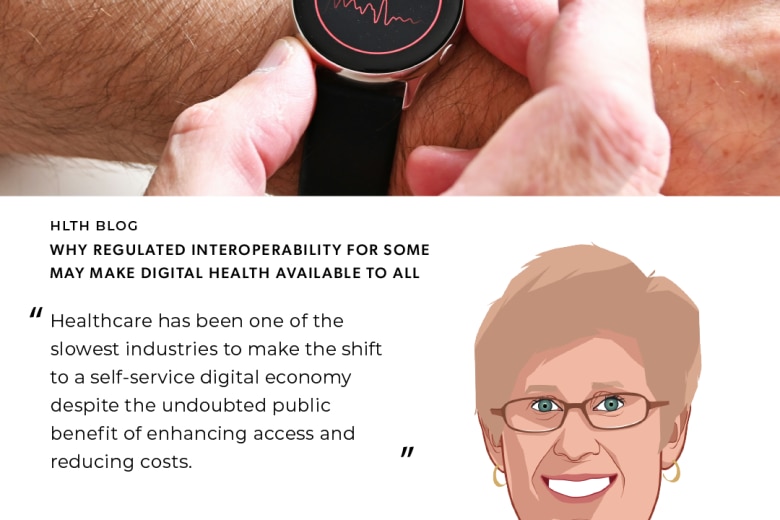Laboratory 2.0: Precision Medicine and the Future of Laboratory Informatics
True Precision Medicine requires all the patient data. And that will have a major impact on Clinical Laboratories.
In my previous post, I explored how the definition of personalized and precision medicine have been changing over time to more accurately reflect the reality of how the healthcare data growth is improving medicine. This post examines how a new understanding of precision medicine is being created through technology and informatics.
According to Dr. Becich “Today it is all about managing data drawn from imaging, longitudinal laboratory data, electronic health records, and so forth. Now more pathologists will embrace computational pathology; we will see pathology informatics as a discipline grow and diversify in ways to help us all. It will include the deeper research enrichment that comes from computational pathology’s ability to bring its own data. And that bodes well for precision medicine.”
Assuming a more expansive definition of Precision Medicine as meaning the use of all available data about that patient to deliver more precise diagnosis and treatment of patients, how does that help us begin achieving results?
Precision and accuracy are often used as synonyms but understanding the difference helps us understand the importance of Precision Medicine and the goals of the health system.
Accuracy describes a particular measurement—that is, how close it is to the truth. But precision describes a measurement system—that is, how good it is at giving the same result every time it measures the same thing. A measurement system can be accurate but not precise, precise but not accurate, neither, or both.
So how does the definition of precision, a measurement system that can produce the same results when it measures the same thing reinforce what Precision Medicine should be?
By replacing the more aspirational Personalized Medicine with a term that focuses on incremental improvements we begin to move from hype to empowerment. Incrementalism is not a negative, but a means to move forward. The ability to make each clinician more precise can occur logically and sensibly as we gain understanding of better ways to provide care.
And this new incrementalism doesn’t take a moonshot or multi-million-dollar deep learning project.
We are already seeing the emerging potential of a more informed clinical precision, that is to say we’re seeing Precision Medicine already at work. It often looks slightly different from both a need and practical application, but is there nonetheless.
One area that Precision Medicine is helping to deliver tangible results is Behavior Health. In a joint project, between InterSystem, Netsmart and the Mental Health Center of Denver, Precision Medicine is finding ways to improve the accuracy and precision of mental health professional. For mental health professionals, Precision Medicine demands using unstructured data as powerful source of predictive indicators, where outside of the specific diagnosis, so much of the clinical interaction is verbal communication about how the patient is feeling and thinking.
In other large organizations, Precision Medicine is being applied to the challenge of big data analytics by providing clinical relevance and improved data presentation to clinicians based on illness type. Patient specific analytics are driving a new level of precision in mining, manipulating and presenting the volumes of available data to clinicians in ways that can be readily interpreted and leveraged. In short, more relevant data and better presentation of that data is making clinicians more precise.
In the diagnostic disciplines, imaging and clinical laboratory clinicians are also working diligently to make this new level of precision a reality.
At RSNA 2016, the idea of expanded clinical context as a necessity for radiologists to improve the precision of their work was a key topic. Dr. Eliot Siegel, who is the chief of imaging at the VA Maryland Healthcare System, Vice Chair of Radiology at the University Of Maryland School Of Medicine has this view of what precision medicine looks like to a radiologist. “I want to consolidate that. I want to be able to combine genomic data and personalize the way I take care of patients, and have that information in front of me, information from the EMR but also from other sources. And I want that information available in real time. As I go to read a study, I want all that clinical information available at that moment. It’s that ‘mission briefing’ concept that was mentioned a few moments ago. And I want to be able to deal with the complexity and volume of information systems right now.”
So, to the radiologist, reimagining how they consume information from the EMR and other sources is Precision Medicine.
I see a very similar future for laboratorians as they move to disrupt the paradigm of order in, result out, even as the industry advances ever more sophisticated genomic and molecular testing capabilities. As my colleague Martin Wilkinson noted in an EPM Magazine article on Empowering Laboratories of the Future “The urgency for change is critical, particularly now with the increasing demand on our healthcare services. To achieve this we must take laboratory systems away from being islands, a back office function and a support for clinicians, to a more clinical, front of house, engaged clinical service. And by creating this change, pathologists can be provided with the information they require, along with clinical indicators, to make decisions as to when appropriate tests are required for patients.“ This need for clinical context will drive the adoption of precision medicine in laboratories.
In each of these cases, Precision Medicine is taking shape, step by step as clinicians are given more information about the patients they treat and are able to be more precise in the care they provide.
For laboratorians looking to reshape Laboratory 1.0 into Laboratory 2.0, seeing how expanded holistic information about patients will pave the way for precision medicine is a vital next step. Understanding that the Precision Medicine of Lab 2.0 is more than lab results and genomic data, it’s all the data that can be gleaned about a patient; lifestyle, demographics, genomic and the full richness of the existing clinical record to drive smarter laboratory decisions and involvement.
We at InterSystems say “incomplete information is incomplete care”, and are striving every day to deliver Precision Medicine to our customers by helping each clinician get more complete information about their patients and be more precise, or at least more precise than they were before.
We’re being more precise about Precision Medicine, and that is a good thing.




































